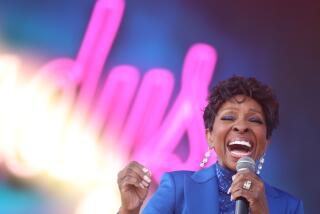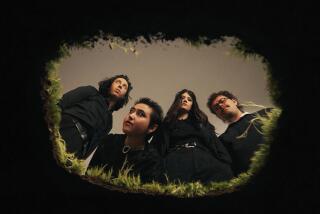Love and Rockets: Agreeing to Disagree
- Share via
Daniel Ash, one-third of the English band Love and Rockets, entered a trailer dressing room at Irvine Meadows Amphitheatre before a recent concert and squinted severely at the harsh fluorescent lighting.
“Can’t we turn those lights off?” he asked. “It’s like a bloody supermarket in here.”
The lights were killed, leaving only a little illumination from a small window to keep the room from being completely dark. As Ash settled onto a small sofa, David J., who splits Love and Rockets’ singing and writing duties with Ash, stepped into the room and immediately asked: “Can’t we get some light in here? It’s like a bleeding morgue.”
A brief discussion ensued. Ash and J. never actually agreed, but settled on a compromise: The light in the room was left off, and a door was opened so light from an adjoining room could filter in while Ash and J. expressed conflicting opinions on a number of subjects for the next 45 minutes.
That, in essence, is Love and Rockets.
The spike-haired Ash--who is flamboyant enough to don fishnet stockings and a mini-dress for the band’s encore--is fairly blunt, sometimes seeming to think as he speaks and prone to making sweeping statements in a working-class English accent disconcertingly reminiscent of the satirical Nigel Tufnel of Spinal Tap. Bassist J., in contrast, is more reserved and pensive, considering a topic before speaking in even, measured tones.
“We usually see eye to eye at the end of the day,” explained Ash, who plays guitar in addition to singing. “But we like a bit of healthy contrast.
“Us two are very different in many respects and I think we learn from each other, really. Particularly on the creative side, there are areas we wouldn’t indulge in normally, both of us. Because of that, hopefully, the group is a more substantial entity through the two or three leanings we have.”
I’s a contrast mirrored by the audience Love and Rockets attracts. With “So Alive”--the first single from the current “Love and Rockets” album--making Billboard’s Top 5 this summer, the trio has reached the level where it can headline big arenas such as the 15,000-capacity Irvine Meadows. (The group returns to the Southland, sandwiched between the headlining Cure and the opening Pixies, at Dodger Stadium on Sept. 8.)
In the process, Love and Rockets has held on to fans who have been with the trio since it was three-fourths of the gloom ‘n’ doom icon Bauhaus in the early ‘80s, while adding new fans attracted by the hits. The resulting audience--predominantly white teens and young adults--is the kind usually reserved for either a hey-let’s-all-party-together band, like Motley Crue, or a hey-let’s-all-be-alienated-together experience, like the Cure or the Smiths. Love and Rockets is neither, but in the Irvine audience it was easy to find both extremes represented.
“No one else can flirt with death and bring it back like Love and Rockets,” said Dave Caspine, 23, during the Irvine concert. “Can’t you hear the afterlife in their voices? They sing about life and death and being alone.”
But right next to him, Eddie Fisher, 20, had a more down-to-earth assessment: “I don’t know, I just like the rhythms and the beats,” he admitted. “I’m not too good with lyrics. I don’t really understand them unless I know the songs real well.”
In either case, it’s an audience with an average age at least a decade younger than the musicians (Ash is 31, J. is 32, and drummer Kevin Haskins--J.’s younger brother--is 29).
Is it awkward to be speaking to, if not for, a younger generation?
“Not at all,” Ash replied. “That’s part of rock ‘n’ roll anyway. It keeps you young. It sort of deliberately keeps you at an adolescent stage in a way. It lets you act like a kid longer than the usual time you’re supposed to.”
Typically, J. disagreed, interrupting Ash: “No, but it’s a more advantaged position we’re in, because you learn from experience, but we still have sympathy for that time of life.”
After a brief argument, Ash confessed: “Personally, I don’t remember going through any big change in my teens. I don’t remember that thing that’s supposed to go on between 15 and 20. Nothing drastic happened to me at that age at all. My voice didn’t even break or anything.”
He didn’t spend hours sitting alone in his room, anguishing, as many of his young fans certainly do?
“Yeah, but I still do that,” Ash said. “That’s what I’m saying. I’ve always done that.”
Nonetheless, Ash shrugged off any implied responsibility held in having young fans.
“Responsibility? None at all,” he said. “If you start worrying about that sort of thing, you can miss your own truths.”
Added J., “Your responsibility is honesty.”
Not that the Rockets haven’t thought about their relationship with their fans. Ever since the Bauhaus days in the early ‘80s, they’ve had steady streams of encounters with and yearning letters from young fans who take their introspective songs very personally.
“We get quite a variety,” Ash said. “From strange obsessive letters to very interesting letters that can give an insight into the music that really hadn’t occurred to us.”
If not responsibility, they do acknowledge a potential power in their position. It’s a subject they have addressed in song.
“Swing the Heartache,” a newly released collection of BBC radio sessions by Bauhaus, includes “Party of the First Part,” which features dialogue taken from a film presenting stardom as a Faustian exercise. And on the new “Love and Rockets” album, the song “Rock and Roll Babylon” presents pop stars as tightrope walkers through whom fans vicariously take risks.
“Anybody that’s in the public eye, people want them to take their chances for them,” Ash said. “But I wouldn’t presume that it’s us.”
J. again disagreed, saying that the risk-taker’s role is indeed something relevant to Love and Rockets’ relationship with its audience. “But if you’re aware of it,” he said, “then you’ve already made a move to avoid it.”
Ash countered: “But it’s not about us. It’s observations about the general things that go on.”
“It beckons, though,” J. insisted. “But we recognized it for what it is, so it isn’t a danger.”
“I find it very presumptuous to think we’re anywhere near that sort of situation where you get into the subject you’re talking about,” cautioned Ash.
With weary, almost patronizing exasperation, J. insisted to his band-mate, “Oh, it happens very early on, in all its insidious forms.”
“Yeah, but we’ve never gotten trapped by that.”
Insistently, J. stated: “No we haven’t. I know we haven’t, because we’re aware of it. But it happens early on. We could have been led down that path.”
More to Read
The biggest entertainment stories
Get our big stories about Hollywood, film, television, music, arts, culture and more right in your inbox as soon as they publish.
You may occasionally receive promotional content from the Los Angeles Times.









